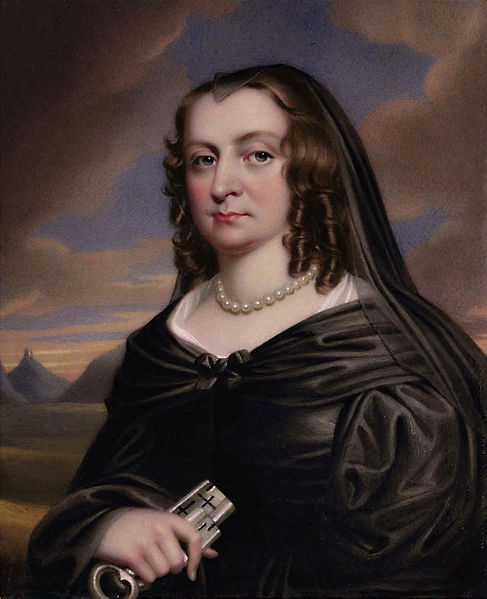Medieval Castle Household
'Queen Mary Psalter - Marriage Feast at Cana’ 1320 (Wikimedia Commons)
More people made up a castle household than I realised.
At the top were the lord and lady (or the king and queen, depending on the castle in question), the nobility – barons, earls and dukes, and the noblewomen who became their wives.
John of Lancaster, 1st Duke of Bedford praying before St George c.1423. Detail from a miniature in the ‘Bedford Book of Hours’ in the British Library - scan by Brandmeister 17 April 2006 (W.Commons)
There weren’t many choices in life for noblewomen. The obvious one was to get married; or they could seek service with a wealthier noblewoman; or they could join a convent and become a nun. Those who were rich had no shortage of suitors because, once married, the woman’s inheritance would pass to the husband.
Sir Thomas and Lady Hungerford, tomb, drawing by Thomas Trotter 1800 (own photo)
The lady of the castle was usually well-educated with the ability to read and write, and was most likely able to speak foreign languages as well as understand Latin. Her responsibilities were many, including being in charge of the domestic running of the castle, overseeing areas like the kitchens and living quarters. As she was in charge of the household, she had to check the accounts and agree to any expenses. She also arranged the accommodation of guests.
Medieval Women Hunting - 'Master of the Epitre d'Othéa' 1407-1409 (W.Commons)
Although her main role was to provide heirs, she was her husband’s equal in her day-to-day support of him, and, when he was away, the entire responsibility of the castle was given to her. There have been examples of women, in their husband’s absence, defending the castle and holding it against the enemy.
An inspiring example (sort of local, for me) is Lady Mary Bankes, the wife of Sir John Bankes, Chief Justice of the Common Pleas. After England’s Civil War broke out in 1642, Charles I ordered John Bankes to serve in London and Oxford. Corfe Castle by then had become the last Royalist garrison on the Dorset coast, and Lady Mary remained at the castle with her children, servants and a force of five men.
Lady Mary Bankes (holding the keys to Corfe Castle with the castle itself in the background) ~ Henry Pierce Bone after John Hoskins (1837)
In May 1643, a force of about forty Parliamentarians demanded the surrender of the castle’s ordnance. Lady Mary’s answer came in the form of cannon fire, which drove them away. Later however, to buy time to resupply the castle, she gave up the ordnance.
A month later, the castle was under siege by a force of about 500-600 men. Lobbing stones and hot embers from the battlements, Lady Mary and her tiny force managed to repel the enemy, killing and wounding over 100 men.
Three years later, in 1646, she was betrayed by one of her own officers, who led a party of Parliamentarians into the castle. With their jackets reversed, they were mistaken for Royalists, and ‘Brave Dame Mary’ had no choice but to surrender the castle. But her courage was acknowledged, and she was allowed to keep the keys to the castle, which can still be seen at Kingston Lacy, a manor house built by her eldest son, Sir Ralph Bankes.
Back to the people in the household…
The Steward was the most senior servant, in charge of the rest of the servants.
The Marshal, sometimes called the Marshalsea, was in charge of the castle in the absence of the lord and lady. As warden of the castle, it was his job to see to the training of the guards, knights and squires. He was also responsible for discipline.
The Reeve saw to the farms and common land belonging to the castle. It was he who collected the rent and taxes.
Knights or men-at-arms lived in the castle grounds, and their duties included protecting the castle and the lord’s lands. A large portion of their day was taken up with patrolling the surrounding area. They also had to practice their weapon skills daily.
‘Knights on Their Horses’ ~ Friedrich Heunert (1836)
Squires were knights-in-training. Apart from book-learning, they had to study archery, sword-fighting and equestrian skills.
Pages not only performed mundane duties such as running errands, delivering messages and serving, they also cleaned weapons and learned the basics of combat.
As mentioned in last week’s post, there was also the kitchen staff, from the butler and pantler to the milkmaid and scullions.
Ploughing - from a 'Book of Hours' illustrated by the Limbourg Brothers (Wikipedia)
Last, but definitely not least, were the peasants. They usually lived and worked on the lord’s estates, farming his land, sometimes paying for the privilege of baking their bread in his oven. It was, undoubtedly, a hard life, the irony being the lord’s lands would yield no produce and income without these lowly workers.
Haying scene - from a 'Book of Hours' illustrated by the Limbourg Brothers (Wikipedia)








